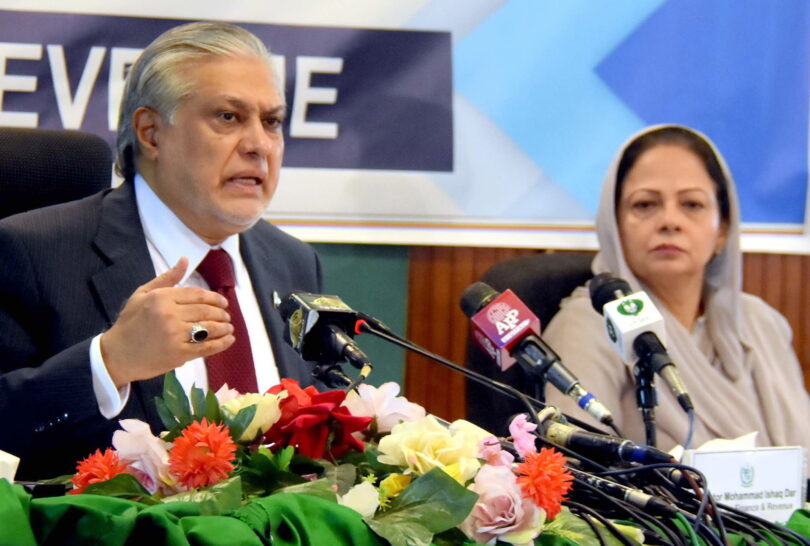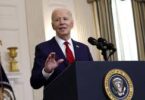F.P. Report
ISLAMABAD: Minister for Finance and Revenue Senator Mohammad Ishaq Dar on Saturday expressed confidence that the federal government would easily achieve the 3.5 per cent growth target of Gross Domestic Product (GDP) set for the upcoming fiscal year with effective and transparent utilization of massive development funds it allocated for the Public Sector Development Programme (PSDP 2023-24).
“I believe if we rightly implemented the PSDP and invested with complete transparency, the GDP growth from 0.29% to 3.5% will be easily achievable. We have set a very modest target and I am very much sure if PSDP funds are invested judiciously, you will find perhaps the 3.5% growth at the lower side,” he said while addressing the post-budget news conference. He said the government allocated a historic size of Rs1150 billion in development funds under the PSDP, which was almost double the funds of Rs567 billion utilized in 2022-23.
In 2017-18, Ishaq Dar said he had presented over Rs1 trillion PSDP budget that was a record-high at that time, while for the year 2023-24 a ‘new-high’ size of the development funds amounting to Rs1150 billion had been earmarked to achieve the required goals of national development and put the economy on a consistent growth trajectory.
He said the GDP growth target was not ‘unrealistic,’ adding the international financial and rating institutions always remained conservative as the Asian Development Bank (ADB) and World Bank (WB) projected the growth at 2 per cent, International Monetary Fund (IMF) itself announced the target of 3.5 per cent, Bloomberg and Fitch rated at 4 per cent while Standard and Poor (S&P) calculated at 2-2.5 per cent.
“As per our professional calculation, it (3.5% GDP growth target) is doable by the grace of Allah Almighty,” the finance minister said confidently. Talking about the drivers of growth, he said the budget for the fiscal year 2023-24 was somehow different from traditional budgets as it focused more on growth that would help create employment, get macroeconomic indicators better, reduce inflation and bring down the policy rate.
He said there was a need to reverse the trend witnessed during the tenure of the past regime, adding the target should be to achieve macroeconomic indicators for the fiscal year 2017. “Once you get that then you have the second goal to achieve a position in G20,” he added. The minister said, “I think being a nuclear power, if Pakistan establishes itself as an economic power that is what the nation expects from us and that is the target of this government, PML(N) in particular”.
He said the country’s economy had come out of the steep vulnerable stage and it was stable now, so further decline had been stopped. “We will try our best to put the economy on a growth path. “This should be our national goal,” he added. For achieving this objective, he said special focus had been put on certain areas to promote growth on a fast-track basis.
Among these areas, the government had prioritized the agriculture sector as it could provide quick dividends, he added. Ishaq Dar said the Prime Minister’s agriculture package helped in producing bumper wheat crops which meant this sector had the potential to give quick dividends, and accordingly, the government enhanced agriculture loans up to Rs 2250 billion. He said the government would strictly monitor loans and ensure their fast-track disbursement adding Rs 30 billion had also been allocated to solarize around 50,000 tube wells.
Special focus would also be given to developing seeds and promoting research to enhance per acre yield, the minister said, adding “We want to bring about an agriculture revolution, and it can happen as we have the potential.” He said seed imports had been exempted from duties whereas the government also withdrew duties on the import of combined harvesters.
In addition, the agro-based Small and Medium Enterprises (SMEs) would be provided concessional loans under a scheme for which required funds had been kept in the upcoming budget, he added. The minister said new agro-based industry having up to Rs 800 million turnover had been given tax exemption whereas Rs 10 billion had been earmarked for youth business agriculture loans
He said Rs 6 billion were set aside for providing subsidy on urea imports if needed. Likewise, the minister said, Pakistan had a great scope in Information Technology and enhanced its exports manifold. He said measures were taken to promote the IT sector, adding the government had fulfilled the demands of the sector.
For encouraging new start-up programmes, the minister said the government would give them exemption on sales tax up to $ 24000 per annum and $ 200 per month.
He said the Small and Medium-sized Enterprises (SMEs) were another important sector being focused by the government as the sector was considered the backbone of the economy in various countries.
The minister said Pakistan had had a weak SMEs sector and arrangements were being made to facilitate the sector with bank loans, adding the government had also reviewed Aasan Financing and Export Finance Scheme for the SMEs that was also under consideration. The minister said the government had allocated Rs10 billion to provide laptops on merit adding that huge funds were allocated for education, women empowerment and the construction sector.
Repeating the main budget targets, he said the outlay of the federal budget 2023-24 was estimated at Rs 14,460 billion whereas the revenue collection by the Federal Board of Revenue would be Rs 9,200 billion out of which Rs 5,276 billion would be shared by provinces. The federal non-tax revenues would be Rs 2,963 billion while the total income of the federal government would be
Rs 6,887 billion and Rs 7,303 billion would be spent on interest payments, he added. The GDP growth rate has been estimated at 3.5 per cent whereas as inflation would remain at around 21 per cent approximately. The budget deficit had been calculated at 6.54 per cent whereas the primary surplus would be 0.4 per cent of GDP. The minister said the government had set up two committees to resolve issues related to businesses and remove technical anomalies. Both committees would be effective from Monday and would work constantly till the winding down of the budget to address genuine issues.
Dar said he seriously considered the proposals given by the parliamentary committees and take decisions on them realistically. To a question on does Pakistan has any Plan-B, if International Monetary Fund (IMF) deal was not finalized, the minister said that self-reliance and standing on their own feet would be the way. He said, “I have categorically said that Pakistan will not default”. Those who are constantly parroting the default mantra actually were responsible for making serious mistakes in the system and were the partners in the crime, he added.
Replying to a question on privatization, he said the government was in the advanced stage of outsourcing the airports to improve facilities, adding companies from 12 countries have shown interest to participate in the bidding process, expected to commence in July. Ishaq Dar said efforts were being made for getting an extension in the GSP-Plus status and hoped it would be done.
To another question, he said population growth was alarming and needed to be addressed; otherwise, it could spoil the development efforts. He said the agenda related to population growth was also pending with the Council of Common Interests (CCI) for consideration.
Answering a question, he said the defence budget of Rs1804 billion was 1.7 per cent of the GDP adding it was not an ambitious one compared to neighbouring countries but a realistic one keeping in view the budget size. To a question about external debt, the minister said the government had no plans for the Paris club rescheduling, “We will not go for rescheduling of the multilateral debt. We will make the payments on time when they become due,” he said. However, the minister said, as far as bilateral debts were concerned there was always room to negotiate but not for haircuts or write-offs.
He said bilateral loans could be negotiated for a long term and this was not unusual because of the Covid-19, flood catastrophe and other confronting challenges. “We will consider and talk to our bilateral partners but have no plan to go to multilateral development institutions requesting them to reschedule our debt. The government will also not reschedule the domestic loans,” the finance minister remarked.







